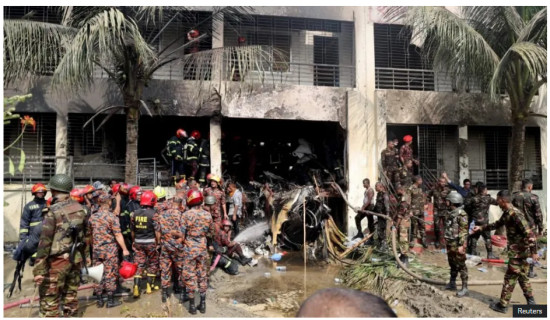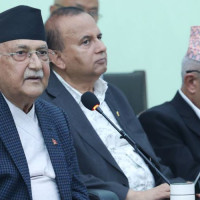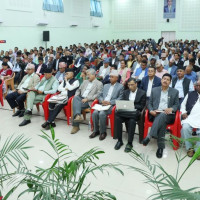- Monday, 21 July 2025
Messaging Without Credibility
Arguments might turn academic: it’s the practitioners and not journalism itself at fault. The larger public might not be as discerning or as bothered to go into the nuances. It is the taste that matters far more than the tenets of a profession or service. The Iran-Israel war (June 13, 2025) once again reiterated that, when it comes to “national interests”, the sound of journalism takes a less than professional tone. The Israeli Defence Force had a military base bombed at a Tel Aviv hospital—a point a large number of media from the Western front chose to skip.
The multiplicity of social media and YouTubers cleared the narrative for a more accurate perspective. The hospital was reportedly equipped with a bunker shielded underground. The reports were not even denied by Israel as well as the legacy media. Information was disseminated in a sketchy and bland manner. The minute blow-by-blow reports they dished out during the Iraq wars and the earlier phase of the 20-year disaster in Afghanistan were completely missing. Such “filtering” sets the tone for an organisation’s agenda-setting process, preventing robust debates on issues of considerable audience interest.
In the 12-day Israel-Iran armed conflict, the “big media” gave hardly any details on the deaths the Israelis suffered and the devastation their cities suffered. Either they didn’t try or didn’t want to report much because of pressure from their organisations' big bosses. Jeremy Corbyn, Britain’s former Labour leader, commented: “Fundamentally, the media narrative on most global channels is essentially pro-Israel despite the genocide in Gaza, despite the deaths and continued occupation in Gaza and the West Bank.” The case is not the first of its type, nor will it mark the end of such a series of stories in the future. Sadly, it upholds a familiar track.
Familiar track
In 2003, Iraqi leader Saddam Hussein did not possess weapons of mass destruction. The United States-led invading nations knew about it. The UN inspection committee did not accuse Baghdad of the charge. Yet an attack was pressed ahead. About a million Iraqi civilians lost their lives—a reference that the global legacy media rarely mention. If they occasionally do, the narrative is short and curt.
The media and their foreign policy analysts and beat reporters in South Asia are reticent about commenting critically on Israeli actions in Gaza and the unilateral move in Iran. They blacked out French President Emmanuel Macron’s remark describing the US President Donald Trump’s warning that Iran’s Supreme Leader Ayatollah Khamenei’s life was in grave danger as a “stupid idea”. Britain’s Economist magazine cited the Israel Defence Forces for destroying “more than 120 of Iran’s ballistic-missile launchers, about a third of the total”. The publication did not bother to report that Tehran had already fired upwards of 450 missiles.
Analysts and media reports in the first two years of the war in Ukraine said: Russia out of munitions, shortage of troops, finding it hard to obtain recruits and financial machine at a collapse. Recently circulated visuals tell a vastly different story but without any apology for the deliberate disinformation. The “global” media have been saying for years that Iran is only a month or two away from going nuke. Yet here we are, with Iran neither being confirmed by the United Nations’ inspection team as close to a nuclear weapon nor the world being told of any “erroneous” reporting.
Israel’s military prowess, sophistication and precision attacks were lauded to the skies for so long that not only the rest of the world but the Israelis themselves came to believe in the exaggeration. The state’s arsenal is largely filled with US and UK hardware. Had the impression created for long by the mainstream media been anywhere close to the truth, there would have been a more massive trail of graveyards in Iran after the Israeli strikes.
On the Gaza tragedy and Israel-Iran flareup, the media huffed and puffed without delving into the events with the clarity they did on developments they could afford to report and opine without self-censorship or “policy” directives. Europe is split over blaming Israel for the conflict, but it does not attract the larger media as a major story material. Conspicuous is the lack of any race for news scoops on Israeli setbacks or blow-by-blow reports on the daily human tragedy in Gaza. Some major international media watchdogs are hesitant to hold robust discussions on the issue, perhaps mindful of their funding sources.
The makers of a documentary film on the Gaza tragedy lamented: “We gathered searing testimony from multiple Palestinian doctors and health care workers…We are desperate for a confirmed release date to be able to tell the serving doctors and medics when their stories will be told.” The documentary was eventually shelved in 2025 when the BBC refused to air it.
Disturbing trend
Protest rallies against attacks on Iran were either ignored or relegated to single-column small items in the print media and brief two-sentence items in broadcast bulletins. New York City and Los Angeles held rallies that wanted the US not to get involved. Mainstream media took little interest in these events. In the earlier part of the war in Ukraine, the press reported that “Russia is losing disastrously”. Not anymore. The language now is subdued. The gradual but obvious erosion in media distrust is echoed by periodic opinion polls conducted by agencies that the legacy media respect or, at least, do not reject.
More than 55,000 civilians have lost their lives in Gaza since the current war started in 2023. How can the media people sleep soundly with such a burden of burying content within their reach? Well, they have. Founded in the United Kingdom, the Centre for Media Reporting (CfMR) report considers the BBC systematically biased against Palestinians in its coverage of the Gaza war. The study showed that the BBC gave Israeli deaths 33 times more coverage per fatality while its presenters aired the Israeli perspective 11 times more frequently than the Palestinian perspective. With professionalism like that, who needs a non-professional?
(Professor Kharel specialises in political communication.)






-original-thumb.jpg)










